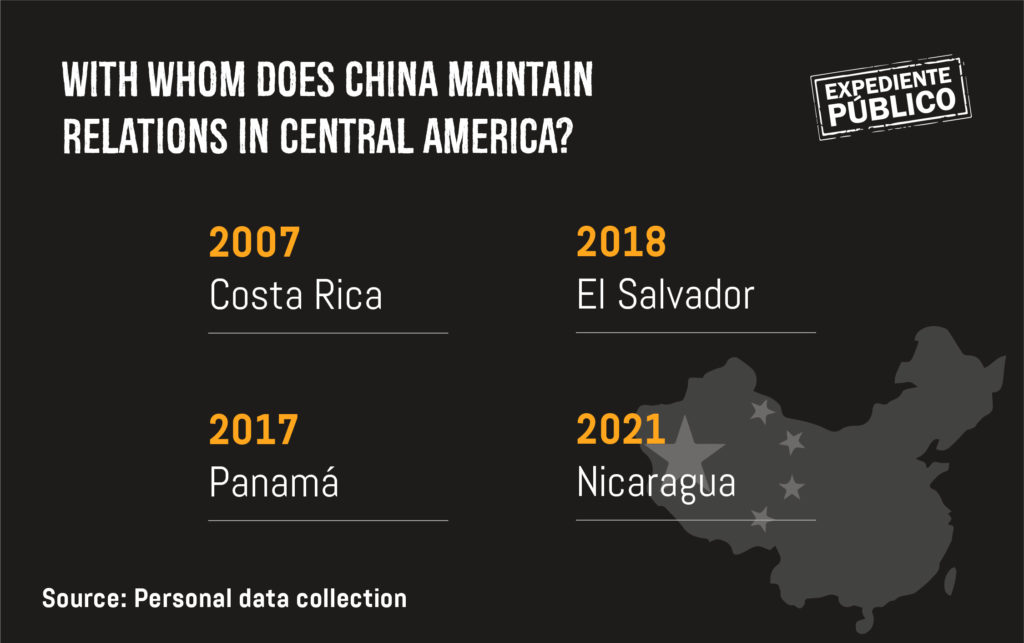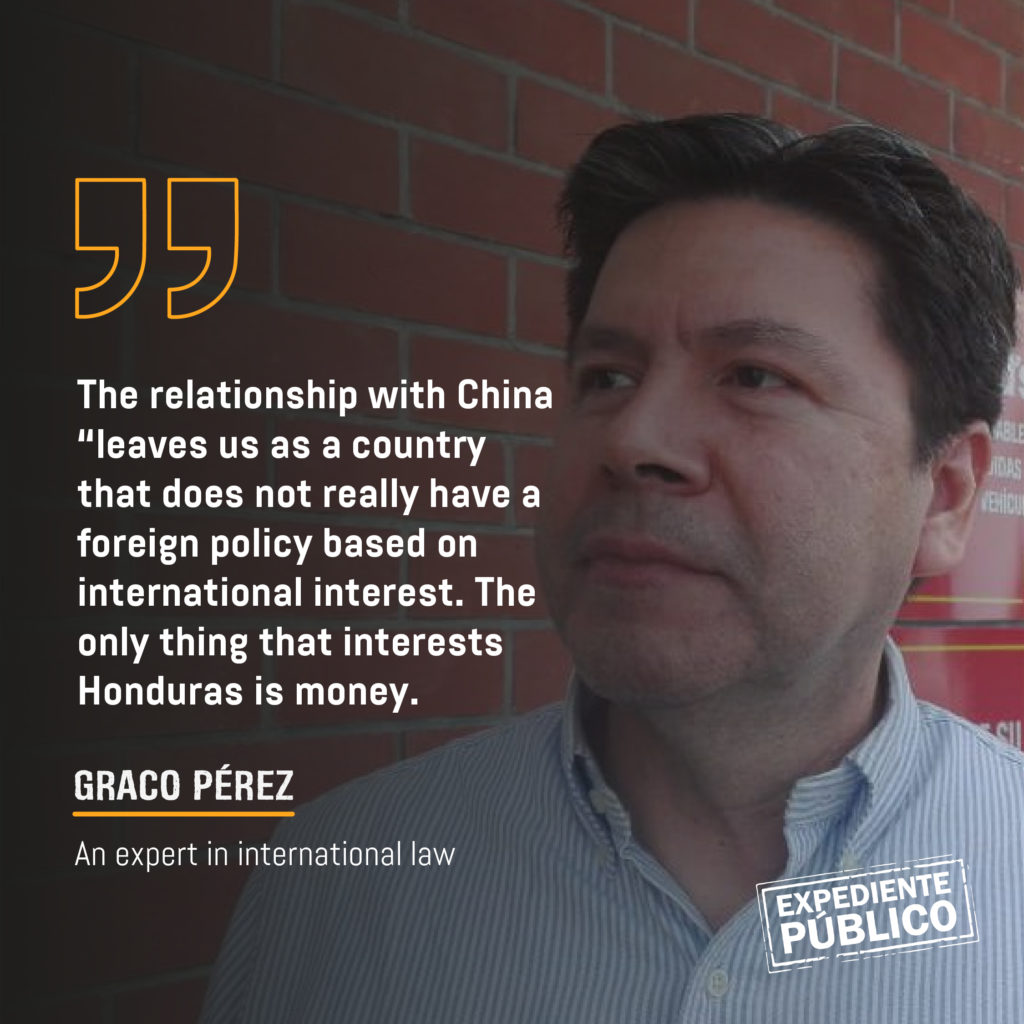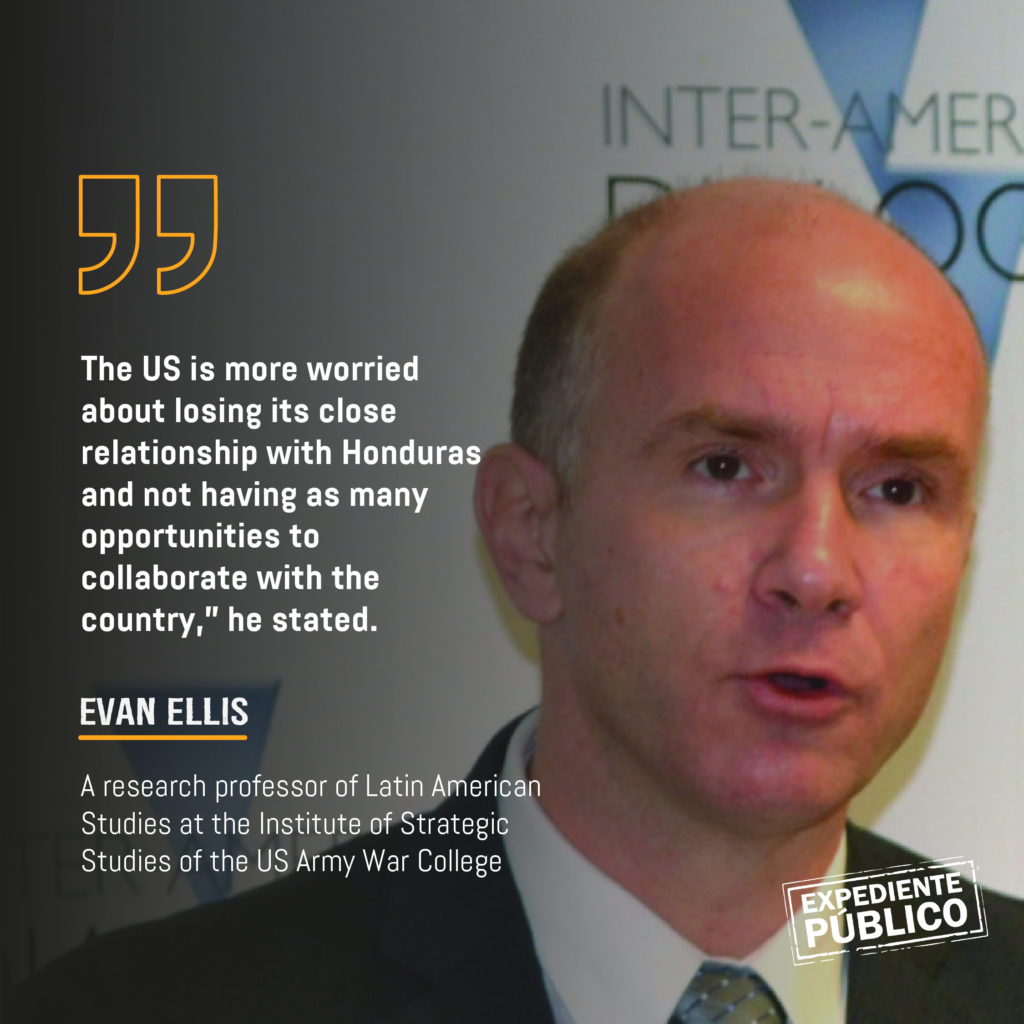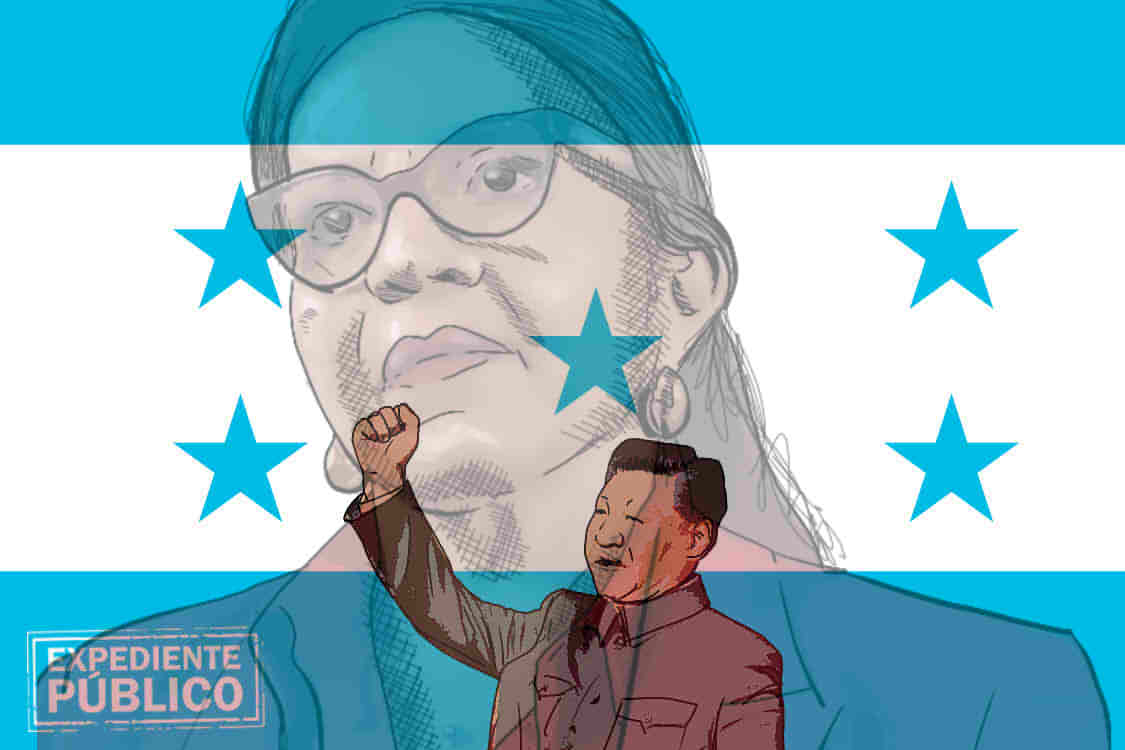*An entire entourage of the government of Honduras traveled to China to establish, formally, diplomatic relations with the country, a situation that caused Taiwan to withdraw its foreign minister, Vivía Chun-fei Chang, from Tegucigalpa.
**Analysts explained to Expediente Público how relations with Xi Jinping would have consequences for Honduras.
***In Central America, China has promised millions of dollars worth of investments, but almost none of them have become a reality.
Yarely Madrid / Expediente Público
The Government of Xiomara Castro made official on March 25 the rupture of diplomatic relations with Taiwan and signed the establishment of relations with China. An entire entourage led by the Honduran minister of foreign affairs, Eduardo Enrique Reina, the daughter of President Xiomara Castro and member of the National Congress, Hortensia Zelaya, and the secretary of the Congress, Carlos Zelaya traveled to China to establish, formally, diplomatic relations between China and Honduras.
Immediately following, Taiwan withdrew its ambassador, Vivia Chun-fei Chang from the country, explaining in a press release that the action was due to the fact that the government of Honduras “was ignoring its diplomatic relationship with Taiwan” as a form of showing “its strong discontent” with the country.
Moreover, Taiwan’s Central Agency of Official News reported that Honduras asked Taiwan for at least 2,500 million dollars in exchange for maintaining diplomatic relations with both countries.
This information was confirmed by the Sub-secretary of Consulate and Migratory Affairs of Honduras Antonio García, who explained that they had in fact asked for that sum of money to buy “an expensive debt with high interest rates.”
The way in which Honduras has broken relations with Taiwan is a bad look for Honduran foreign affairs as it has shown that the country “sold itself to the highest bidder,” according to experts interviewed by Expediente Público.
The interviewees are concerned about there being an invasion of Chinese military forces in the country, in addition to the Honduran relationship with the United States, which, to date, has been positive.
Read: Honduras, el nuevo botín del dragón chino en Centroamérica
Unsatisfied
The relationship between Taiwan and Honduras goes back to 1941 when Taipei still had its headquarters in China. On Saturday, March 25, it was learned that Harold Burgos, ambassador of Honduras in Taiwan left the island that day, confirming the severing of diplomatic ties between the two countries.
In a statement, the department of Latin American and Caribbean Affairs of Taiwan expressed to the government its lack of satisfaction with the Honduran government for sending an entourage headed by the Honduran foreign minister, Eduardo Enrique Reina, the daughter of President Xiomara Castro, and her brother-in-law to discuss diplomatic relations with China.
“Honduras is ignoring the achievements of the long-standing cooperation between our two countries, as well as the willingness of Taiwan to give assistance to resolve issues in Honduras. These actions seriously damage the feelings surrounding the government and the people of Taiwan,” he manifested in the statement.

Expediente Público was in contact with the representatives of the diplomatic headquarters of Taiwan in Tegucigalpa, who expressed that the “embassy does not have a comment regarding the statement.”
Blackmail?
The Taiwanese foreign minister, Joseph Wu, said in a meeting with the Committee of Foreign Affairs that “Honduras asked for a high price” to maintain the diplomatic ties between the two nations. Wu affirmed that Taiwan did not enter into a “game of monetary diplomacy” with Pekín, who is accused of repressing the island at the international level.
The foreign minister’s statements occurred after a source gave Reuters a report from Taiwan’s Central Agency of Official News, which revealed that the public official had written to the Ministry of Foreign Affairs of the island country demanding money.
This story was confirmed by the Sub-secretary of the Consulate and Immigration Affairs Antonio García, who indicated in a Honduran news outlet that the government had asked Taipei for more than two billion dollars to aid in resolving the country’s external pubic debt issues.
“We asked three things of them; we did not ask them to throw money at us but rather to buy expensive, high-interest debt so that we could pay them for the same debt but with lower interest rates and saving millions of dollars,” explained García.
“Sadly, they could not respond in this manner, and it pains me to say that Honduras must look for other opportunities.”
The decision was due to debt issues
Previously, foreign minister, Enrique had told the national media that the decision to establish diplomatic ties with China was due to the fact that the Central American country was “up to its neck” in financial challenges and debts, “including 600 millions dollars that the country owes Taiwan.”
In this sense, Antonio García explained that “this is the reason why they have sought to restructure the debt and pay it off under better terms and conditions, so that the country would experience some financial relief.”
Read: Ausencia de Honduras en Alianza para la Prosperidad la aleja más de Estados Unidos
Will China pay Honduras’ debt?
According to the digital media outlet, the Taipei Times, China had offered Honduras between 10,000 and 20,000 million yuans (1.46 and 2.95 million dollars, respectively) to establish diplomatic relations with the Asian country.
The vice minister of the Council on Continental Affairs, Jan Jyh-horng, said that the media outlet “really [did] not have anything to say” on the matter.
The spokesperson of the Chinese Ministry of Foreign Affairs, Wang Wenbin, welcomed the “positive posture” from Honduras regarding the development of a relationship with China.
When he was asked if China was supporting Honduras in the way that had been mentioned in the media, he stated that “the accusation was absurd.”
Honduras “sold itself to the highest bidder”
According to the international law expert, Graco Pérez, “getting close to China at a time when it is seen as a threat by Honduras’ allies leaves us, as a country, without a foreign policy based on international interest. The only thing that interests Honduras is money.”
We are seeing “the buying and selling of illusions for the population and the entry of resources for the government that are not going to reach the Honduran people,” said Pérez to Expediente Público.

The expert explained that “this is not the way to handle international relations because it is not in the interest of Hondurans but rather in that of the government.”
“Honduras is losing”
Graco Pérez predicted that China, “at the beginning, would be very kind to Honduras but that the experience of other countries has been that with the passage of time, its relationship with China will not really be beneficial to the country but rather, the contrary of that.”
The professor and researcher of Latin American Studies at the Institute of Strategic Studies at the Army War College, Evan Ellis, shared this same opinion with Expediente Público.
“It would be the first time in recent months that China has quickly delivered on what it has promised. For example, in the case of Costa Rica, its projects have not gone well. Projects in Panama, the Dominican Republic, and El Salvador have also not gone well, despite the enthusiasm around the initiatives at the time.”
“Regarding big promises, China has not kept its word. There is also the possibility that there are too high of expectations. There are always high expectations that a country is going to become more wealthy with the ability to export a lot of predestined products. This has never occurred in Costa Rica or in El Salvador,” he said.
Central America is separating from Taiwan
Honduras is not the only Central American country that has broken relations with Taiwan to establish relations with China. Costa Rica followed this path in 2007, with Panama, El Salvador, and Nicaragua doing the same in 2017, 2018, and 2021, respectively.
In the cases of Nicaragua and El Salvador, the situations were different because the countries were attempting to send a message of defiance to the United States. In Nicaragua, it was such that the Daniel Ortega regime seized the Embassy of Taiwan in Nicaragua, even though the Asian country had helped the nation for years, particularly during 2020 and 2021, when it supported the Nicaraguan population in the most difficult part of the COVID-19 pandemic.
Meanwhile, Costa Rica, Panama, and Honduras (based on the government’s discourse) are looking for an opportunity to diversify their markets and have more exporting power.
Evan Ellis pointed out that the United States’ losing influence in Central America could be a problem. “If these countries are more willing to collaborate with China than with the United States in political, economic, and security affairs, we have a serious problem,” given that the United States seeks to combat narco trafficking and migration. Not having a partner with which it can cooperate, maintain a trusting relationship, and work closely with on security issues, could unleash a crisis.

Relationship between Honduras and the United States
Read: China y sus niveles de penetración en tres países de Centroamérica
Ana María Méndez of the Washington Office on Latin America (WOLA) commented to Expediente Público that other countries have made this same decision and that their relationships with the United States have been affected. “Not even Nicaragua is one of the biggest critics in terms of countries because the United States is one of its main commercial partners.”
Méndez stated that the alliance between Honduras and China is “something that is symbolic, maybe even ideological, but that is different in practice,” given that the relationship will continue to be the same even if the countries are democratic and respect human rights.
Likewise, he indicated that lately, President Castro had been meeting with Christopher Dodd, a public official close to Joe Biden who, according to Honduran Foreign Minister Reina, had said to Castro’s government that Honduras was sovereign but that it needed to be much more careful with whom it established relations.
Read: China y sus niveles de penetración en tres países de Centroamérica
However, something that should be of concern to the United States, according to Evan, is the US Army’s Joint Task Force, Bravo, which continues to carry out operations at the Palmerola Airport in Honduras.
“The US is more worried about losing its close relationship with Honduras and not having as many opportunities to collaborate with the country,” he stated.
However, he explained that “more than anything, the concern is with regard to other issues, especially logistics, influence, and collaboration between the United States and Honduras.”





